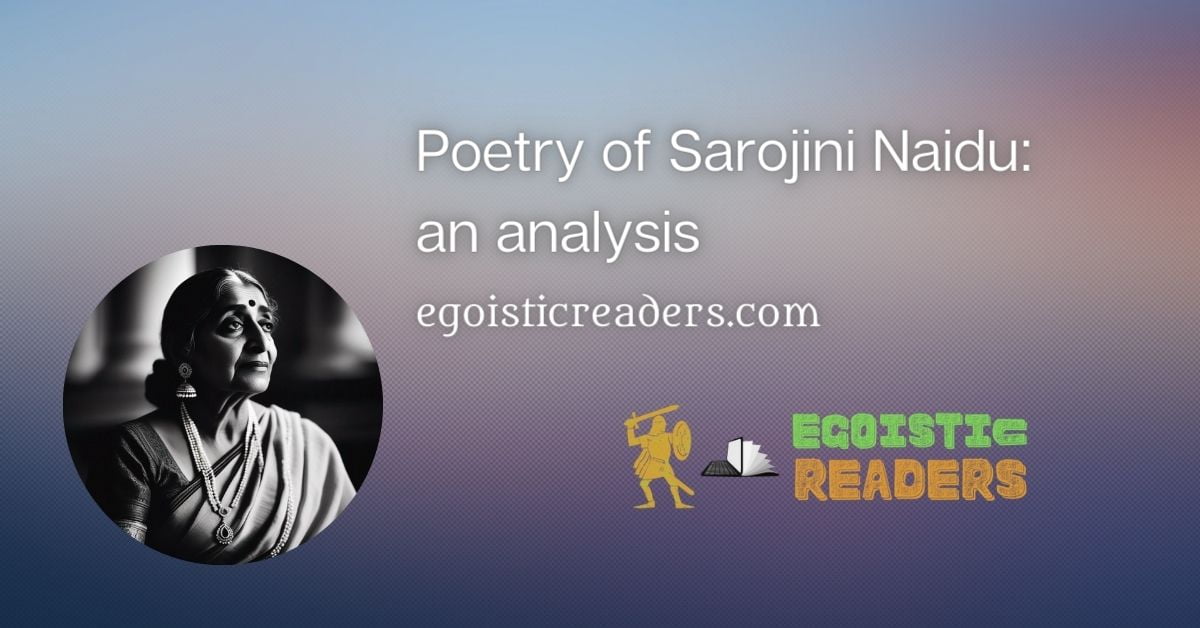Sarojini Naidu often hailed as the “Nightingale of India,” carved a niche for herself in the literary landscape through her enchanting poetry that melded lyrical beauty with a deep resonance for the socio-political milieu of her time. Born on February 13, 1879, in Hyderabad, Naidu’s poetic journey unfolded against India’s struggle for independence, infusing her verses with a profound sense of patriotism and a call for societal reform. Or, at least, it developed against this backdrop rather than being engendered this way! Naidu, in the beginning, wrote poetry to make the King happy and later, her peers and superiors (of English origin). It was only after a reality check by one of her English well-wishers that she brought back the compass of her poetic imagination to India.
Read this article to learn more about Naidu: Sarojini Naidu
Lyrical Symphony:
Naidu’s poetry is a lyrical symphony that captures the essence of India’s cultural richness, weaving together vivid imagery and evocative language. Her debut collection, “The Golden Threshold,” published in 1905, introduced readers to her enchanting world of words. In “Palanquin Bearers,” Naidu employs exquisite imagery, describing the ceremonial entry of a bride into her new life. The poem not only showcases her command over language but also heralds her feminist inclinations, subtly questioning societal norms.
The lush verses of “The Indian Weavers” paint a poignant picture of the toil and artistry of Indian weavers, intertwining their labour with the nation’s cultural tapestry. Naidu’s ability to infuse everyday scenes with poetic grandeur reflects her commitment to celebrating the ordinary and elevating it to the extraordinary through the sheer beauty of language.
Nationalism and Freedom:
Sarojini Naidu’s poetry mirrors the pulsating heartbeat of a nation yearning for freedom. In her collection “The Broken Wing,” the poem “Wandering Singers” encapsulates the spirit of the Indian independence movement. The wandering singers, representing the marginalized voices of society, become harbingers of change, echoing the sentiment that freedom is not merely a political ideal but a cultural awakening.
Her stirring poem “Coromandel Fishers” stands as a testament to the symbiotic relationship between the fishers and the sea, drawing parallels with the quest for independence and the resilience required to navigate turbulent waters. Naidu’s verses became anthems of defiance and hope, providing solace to a nation grappling with the shackles of colonialism.
Critical Reception and Peer Opinions:
The reception of Sarojini Naidu’s poetry was marked by acclaim, but like any literary figure, she faced scrutiny. Renowned literary critic E. M. Forster, while appreciating Naidu’s craft, remarked that her poetry lacked the “instinct for form.” However, other contemporaries saw her work differently. Rabindranath Tagore, a towering figure in Indian literature, acknowledged Naidu’s poetic prowess and her role in fostering a sense of national identity through her verses.
Amidst the accolades and critiques, Naidu’s poetry found resonance with fellow poets and intellectuals. Mahatma Gandhi, a stalwart in the Indian independence movement, admired her poetic expressions and their role in galvanizing the masses. Naidu’s close association with Gandhi and her active participation in the freedom struggle elevated her poetry beyond literary appreciation to a tool for societal change.
Legacy and Contemporary Significance:
Sarojini Naidu’s poetry, while rooted in the historical context of India’s fight for independence, transcends temporal boundaries. Her verses continue to inspire generations, resonating with those who seek to understand the tapestry of Indian identity and the enduring spirit of freedom.
In contemporary times, scholars and poets reflect on Naidu’s legacy, exploring the intersectionality of her feminist ideals, nationalist fervour, and poetic craftsmanship. Dr. Aparna Dharwadker, a notable literary critic, emphasizes Naidu’s role in shaping a nationalist aesthetic, shedding light on the intersection of gender, politics, and literature in her works.
Conclusion:
Sarojini Naidu’s poetry remains a testament to the transformative power of words. Her verses, adorned with elegance and laden with revolutionary fervour, continue to echo through the corridors of literary history. As we delve into the rich tapestry of her poetic legacy, we encounter not just a poet but a visionary who used her pen to craft a vision of a free, enlightened, and culturally vibrant India. In the realm of Indian literature, Sarojini Naidu stands as a luminous star, casting her poetic brilliance across the pages of time.
Written by Amit for Egoistic Readers




